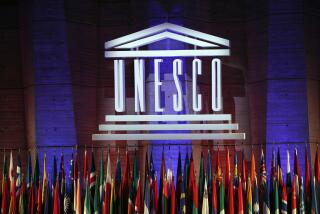Arab League Calls Iraqi Council ‘a Start’
- Share via
CAIRO — Members of the Arab League decided Tuesday not to recognize Iraq’s U.S.-appointed governing council, saying they would wait until a government is elected.
Arab officials welcomed the council’s creation as a first step toward new leadership in post-Saddam Hussein Iraq. But their decision reflected the distance Arab governments are keeping from the body, which has been dismissed by many in the Arab world as a puppet of Iraq’s U.S. and British occupiers.
The decision means Iraq’s seat at the 22-member Arab League will remain vacant for the time being.
“The council is a start, but it should pave the way for a legitimate government that can be recognized,” league Secretary-General Amr Moussa said after a committee of foreign ministers met to forge a unified stance on the issue.
The top U.S. administrator in Iraq, L. Paul Bremer III, said in late July that general elections to replace the governing council could be held in Iraq within a year.
The council did not send representatives to Tuesday’s meeting in Cairo. Members had bristled at earlier hints from Moussa that the league would not embrace the new body.
“We don’t want to go where we are not welcome,” council member Nasir Chaderchi told the Arab-language satellite TV channel Al Jazeera last month. No comment was available Tuesday from the council.
Last month, several council representatives appeared at the United Nations, but no seat was granted at the world body.
The Arab League was deeply divided over the U.S.-led war to topple Hussein. Most sharply opposed it, but Saudi Arabia, Kuwait and several other nations actively supported the invasion. Many Iraqis felt that they were betrayed by fellow Arabs who had supported Hussein.
In Washington, State Department spokesman Philip T. Reeker did not respond directly to the league’s announcement, saying he was not aware of any final decision. But he said Secretary of State Colin L. Powell has argued to Arab leaders that the Iraqi council deserved and needed recognition
“It really represents the beginning of a new Iraqi government for the people of Iraq, representative of geographic and ethnic, and tribal and religious, diversity of the country,” Reeker said. “We think it’s important that this structure be given the support from the region, as well as the world, international community more broadly, as the United Nations has.”
The 25-member council held its first meeting July 13 and later named a nine-member presidency. It has the power to name ministers and approve the 2004 budget, but final decisions in Iraq still rest with Bremer.
More to Read
Sign up for Essential California
The most important California stories and recommendations in your inbox every morning.
You may occasionally receive promotional content from the Los Angeles Times.













